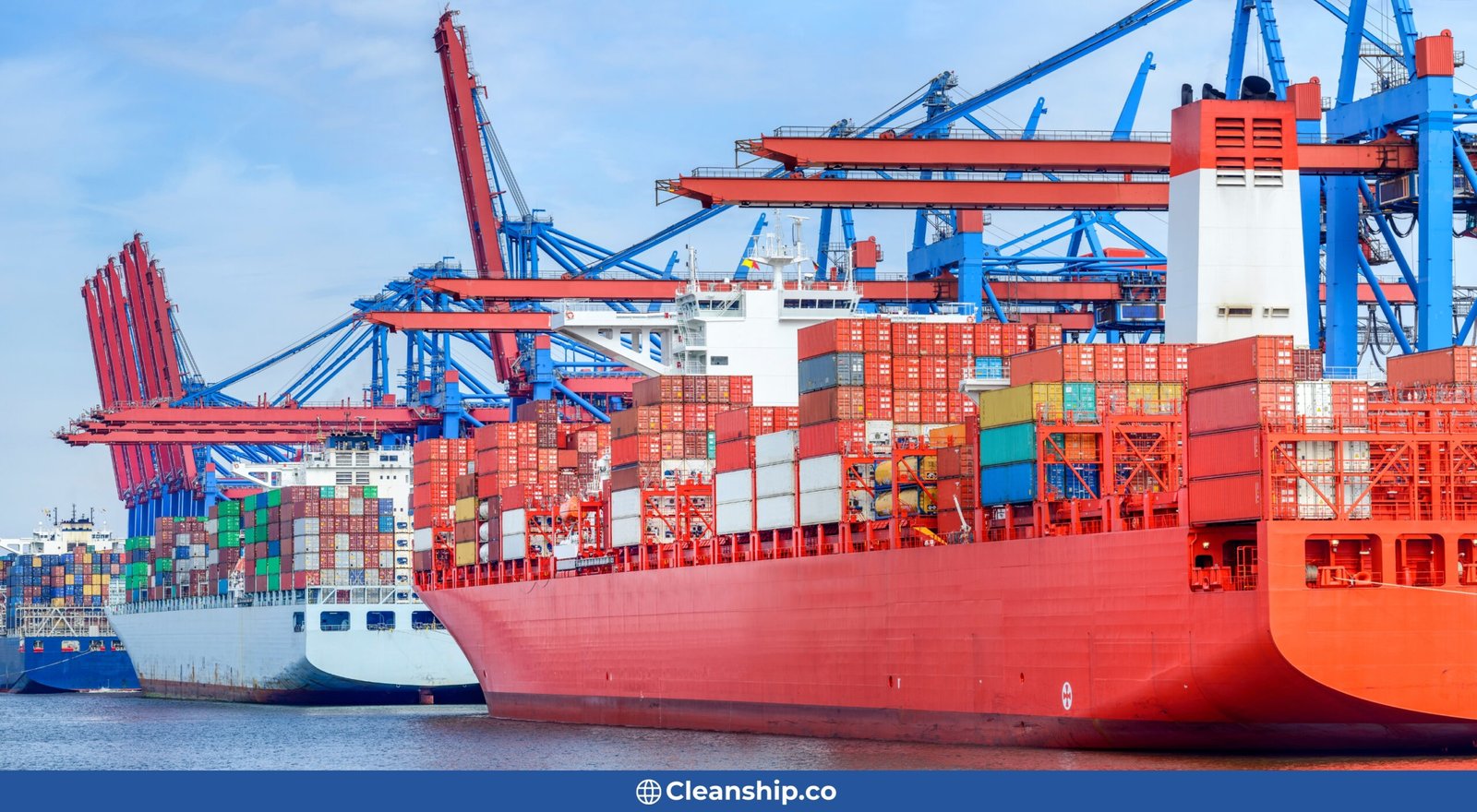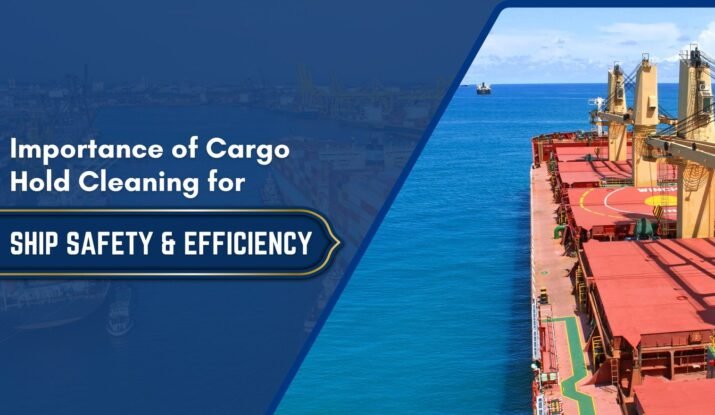Shipping plays a vital role in the world of trade. This is how ships transport goods across seas from one port to another. It may be goods, raw materials, or machinery. The cargo hold is where everything gets stored in a ship.
It’s not only a matter of good appearance to keep this space clean but also a matter of preventing ship damage. This blog will show how proper cleaning of cargo holds reduces damage to ships. It is crucial for ship owners, operators, and all in the maritime world.
If you are looking for professional hold cleaning services in India, do not hesitate to get in touch to ensure your ship’s cargo hold is properly maintained and safe for transport.
Table of Contents
ToggleWhat is a cargo hold?
Let us, at the very beginning of our discussion of why cleaning matters, define for you what a cargo hold is. A cargo hold is a spacious chamber in the ship’s bottom. It’s where they store cargo. It was built to carry a mix of goods and materials. These range from dry items like grains to liquids and heavy equipment.
These holds withstand very rugged loads. But cleanliness is essential. Dust, debris, and residues in the cargo hold after unloading can be serious. Let’s find out how.
Key Reasons Why Cargo Hold Cleaning is Important for Ship Safety and Efficiency
1. Preventing Corrosion
One of the main problems with bad cargo hold cleaning is corrosion. Cargo holds are usually made from steel, and steel is likely to rust in the presence of moisture. Uncleaned cargo holds can leave salt water, oil, or chemicals.
These may appear harmless, but they could cause gradual corrosion of the metal over time. This would weaken the ship’s structure. It could lead to costly repairs and, in extreme cases, a risk to all on board.
It removes harmful residues that can cause corrosion. This keeps the ship in excellent condition. Regular maintenance and cleaning can extend the ship’s life. It can also avoid costly damage.
2. Reducing Cargo Contamination
Cargo hold cleaning will be necessary to prevent contamination that could affect upcoming cargo. Loading cargo in the hold can leave dirt and dust from past shipments. Mixing it with the new shipment is risky for food, drugs, and dangerous chemicals.
If the crew carries coal or grain in the ship’s hold and fails to clean it, they will contaminate the next food shipment. This might cause health problems and affect the reputation of the shipping company. A clean cargo hold will keep the cargo free from earlier contaminants. This will maintain its quality and safety.
3. Reducing Mold and Fungi Growth
Cargo holds that are not wiped and cleaned can become bad breeding places for mould and fungi to grow. Moisture from wet cargo, like wood or chemicals, remains in the hold after unloading. The mould can damage not only the ship itself but also the cargo it carries.
In the worst case, mould may ruin perishable goods. They would then be unsellable and unsafe to eat. It can also weaken the ship’s structure, harming the crew. Cleaning, along with good ventilation, prevents mould and fungi. This creates a healthy environment for the ship and its cargo.
4. Avoiding Dangerous Chemical Reactions
Sometimes, the cargo space transports chemicals or hazardous materials. If not cleaned after a shipment, residues of these chemicals may mix with other cargo in future shipments. This may cause the worst-case scenarios: combustions, explosions, or toxic discharges.
Efficient cargo hold cleaning requires the necessary tools and tips to get the job done effectively. By using the right tools and following best cleaning practices, shipping companies can maintain the safety of their ships and cargo while minimizing the risk of contamination and damage.
5. Improving Ship Efficiency
Clean cargo holds also lead to improved performance in the ships. The dirt and debris inside the hold will make it more challenging to load and unload the cargo. It makes the whole process slow, hence decreasing the efficiency of the ship. Proper practices and techniques for cleaning the cargo hold will ensure smooth operation, save time, and avoid delays.
The clean cargo hold also improves the fuel efficiency of the ship. With efficient loading and clear pathways, the ship can achieve an even distribution of its load. This will make the voyage smoother and reduce fuel use. It will also cut the ship’s travel costs and environmental impact.
6. Preventing Unwanted Odors
Neglected cargo holds contribute to the persistence of bad smells. Odors can have a wide range of differences. They may come from a spoiled cargo product, moisture, or residue from previous cargo. But the odours make the ship unpleasant for the crew and unhealthy for the cargo.
For instance, if the ship carried livestock or fish, a bad smell would remain if the hold was not cleaned. These smells might affect the next shipment of products and destroy the cargo. Shipping companies clean their ships’ cargo holds to remove odours. This prepares them for any cargo.
7. Compliance with maritime regulations

Maritime authorities set rules on cargo hold cleanliness for ship owners and operators. The International Maritime Organization (IMO) has strict cargo hold cleaning rules. They are especially important for ships that transport food or chemicals. Not following those rules may lead to penalties, fines, or a port ban.
Cleaning of cargo holds ensures that the ship is within the regulations. Legal troubles and risks to crew members and the environment are thus avoided.
How to Clean a Cargo Hold Correctly
Knowing that cleaning is essential, let’s go through the process of how to clean a cargo hold effectively.
- Check for Damage: Check the hold for corrosion, leaks, or damage. Detecting problems at an early stage can save much time and money later.
- Remove All Cargo: Ensure the cargo hold is empty before cleaning. Leftover items could interfere with the cleaning and contaminate the area.
- Clean the Surface: First, clear the cargo hold’s walls, floors, and ceiling of dust, debris, and dirt. You may use brushes, scrapers, or vacuum cleaners in this process.
- Detergents Cleaning: Use the right cleaning agents based on the residue left. We need special agents designed to neutralize chemical residues.
- Dry and Ventilate: After the cleaning process, it is vital to dry out the hold as much as possible. Good ventilation will prevent the hold from getting moisture which leads to mold or rust.
- Disinfect (if necessary): If bacteria or fungi are present, use disinfectants to kill them.
- Final Inspection: After cleaning, inspect the cargo hold again before clearing it for the next shipment.
Conclusion
Cleaning the cargo hold is not good housekeeping. It is vital for ship maintenance. It reduces damage to the ships and their cargo. Preventing corrosion, contamination, and dangerous chemical reactions will save money. It will preserve and improve shipping efficiency. Regular cleaning keeps the ship and its crew safe. It also meets maritime regulations.
Cleaning cargo holds is more than good housekeeping. It is key to maintaining the ships. This should reduce damage to the ships and their cargo. Preventing corrosion, contamination, and dangerous chemical reactions will save money. It will preserve goods and improve shipping efficiency. The vessel will always be safe. It will follow maritime regulations due to regular cleaning.
Frequently Asked Questions
Does proper cleaning extend the life of a ship?
Yes, it prevents corrosion and wear. This increases the ship’s lifespan and lowers repair costs.
What is the most effective method for cleaning cargo holds?
The best ways to clean cargo holds are pressure washing, dry cleaning, and using safe, non-toxic chemicals.
How does cargo hold cleaning affect cargo safety?
A clean cargo hold will reduce contamination and keep the cargo in good condition.
Can cleaning cargo holds help enhance ship performance?
Yes, regular cleaning maintains the ship, cuts costs, and boosts performance.
What harm could occur if someone fails to clean the cargo holds thoroughly?
Dirty holds could result in mold, rust, and residues damaging both the ship and the cargo.
How often must someone clean the cargo holds?
The crew must clean the cargo holds after each voyage. We must maintain the ship’s integrity. The cargo needs a clean environment.

